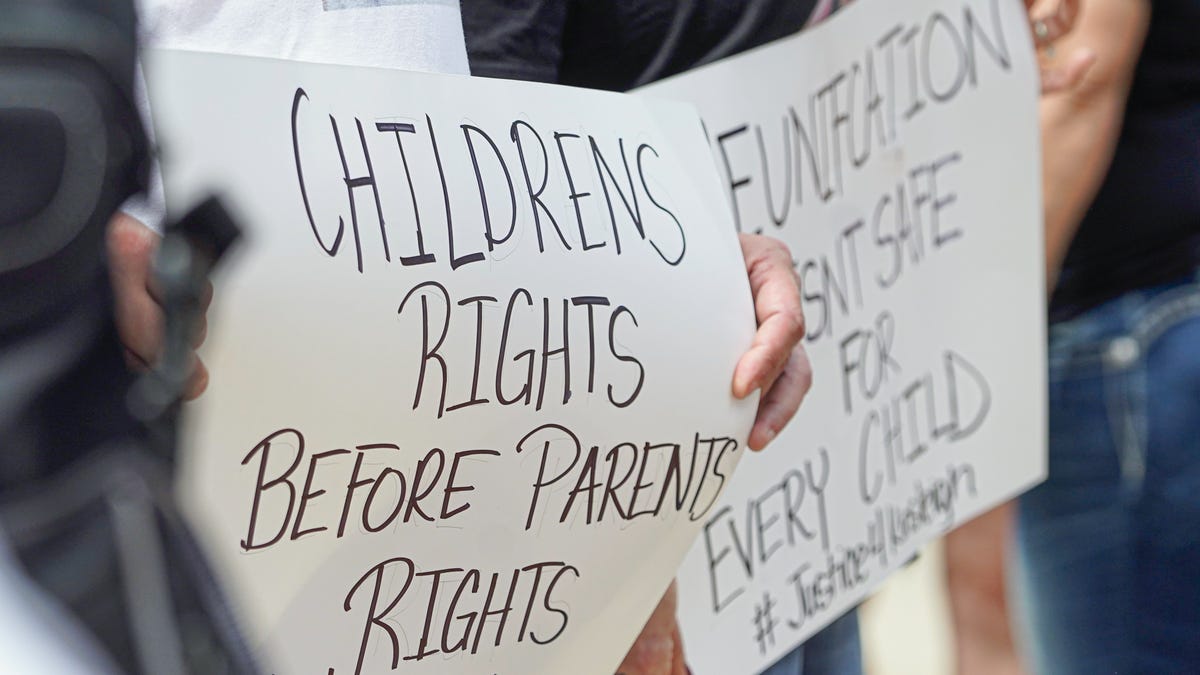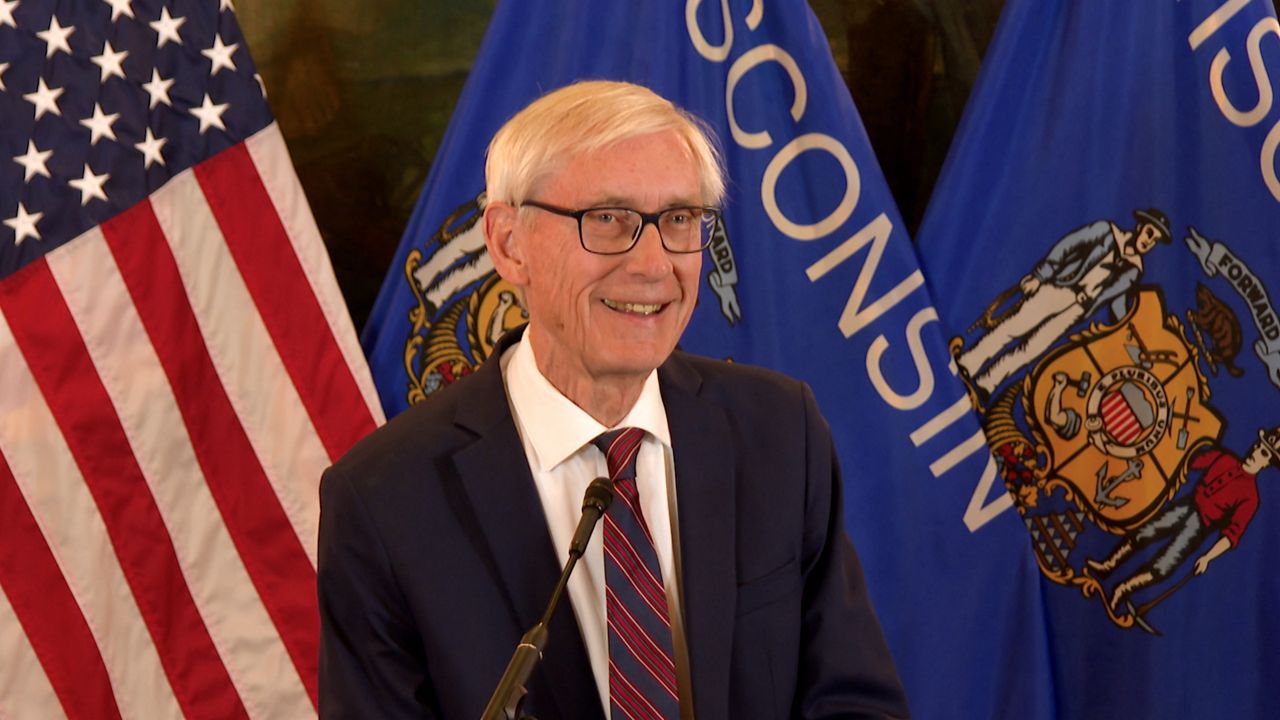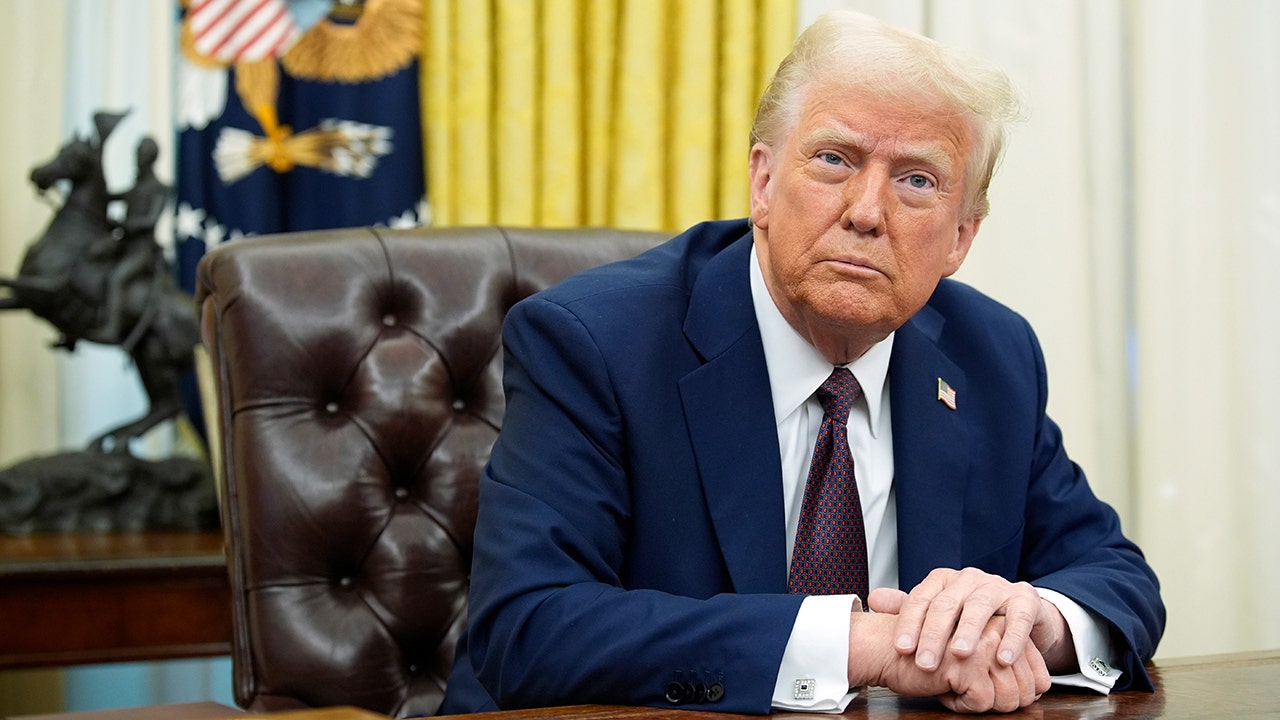World
Congo votes for president as conflict and smudged ballots lead to fears election won't be credible
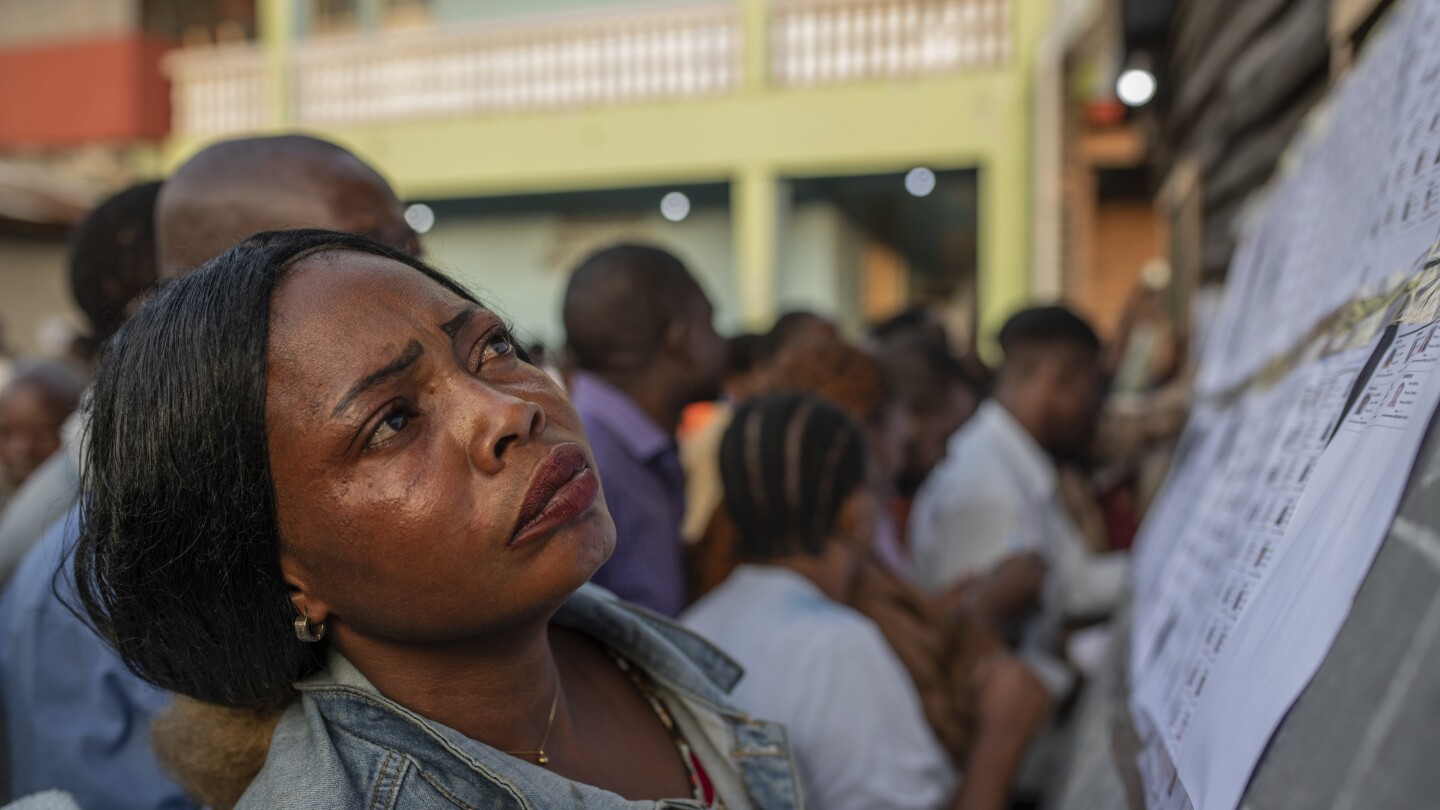
KINSHASA, Congo (AP) — Congo headed to the polls Wednesday to vote for president as authorities scrambled to finalize preparations in an election facing steep logistical and security challenges. But an hour and a half after voting was meant to start, people in the capital were still waiting in line, yet to cast a ballot.
Some 44 million people — almost half the population — were expected to vote, but many, including several million displaced by conflict in the vast country’s east, could struggle to cast their ballots. The fighting has prevented 1.5 million people from registering to vote.
Voter Raymond Yuma in the capital of Kinshasa said he’s voting for hope. “When you wake up in the morning you’re hoping for good things, good work, and I want security,” said Yuma. He sat beside three other people on a bench waiting in line for the doors to open. None of their voting cards were legible.
In eastern Congo, people said they weren’t finding their names on voting lists.
“The voters displayed on lists at the polling station are fewer than those who are lining up. I can’t find my name on the list and this could cause scuffles here because I also want to vote,” said Jules Kambale at a polling station in Goma.
As the delay for voting stretched on, people grew agitated and began arguing, particularly in the capital.
Both outside observers and locals have warned of challenges that could affect the credibility of the vote in one of Africa’s largest nations and one whose mineral resources are increasingly crucial to the global economy.
On the eve of the vote, some polling stations in Kinshasa told Associated Press journalists they were still waiting for materials. Thousands of stations, particularly in remote areas, might still not have what they need on Wednesday.
A major concern is that ink on voting cards has smudged, making many illegible. That means people could be turned away from polling stations. In addition, the voter registration list hasn’t been properly audited.
“The organization of the elections raises lots of doubt regarding the credibility, the transparency and the reliability of the results,” said Bienvenu Matumo, a member of LUCHA, a local rights group.
A candidate needs a majority of votes in the first round to win.
President Felix Tshisekedi seeks his second and final five-year term, running against about 20 other candidates. His main rival appeared to be Moise Katumbi, the former governor of Katanga province and a millionaire businessperson whose campaign in 2018 was thwarted by the previous regime of former President Joseph Kabila.
But the opposition remains fractured, making Tshisekedi the likely favorite.
The son of a late, popular opposition figure, he has spent much of his presidency trying to consolidate power over state institutions and working to overcome a crisis of legitimacy after a contested election five years ago.
Some voters didn’t want to disclose who they were backing, but Kinshasa is a Tshisekedi stronghold.
“He’s someone who’s done a lot of things for the country … he’s fought for democracy,” said Joseph Tshibadi, a business owner. Even though Tshisekedi hasn’t succeeded in quelling violence in the east, Tshibadi is willing to give him more time.
“The beginning is always hard,” he said.
The election commission says it has made changes in the process to make it more credible, spending more than $1 billion on the vote since planning began two years ago. A key change from 2018 is that results from each of the 75,000 voting stations will be released one at a time, rather than being announced in bulk.
But given the logistical challenges, locals and analysts said the vote likely will be extended past Wednesday.
The results that should determine the winner should be the manual ones rather than the electronic count, said Rev. Eric Nsenga, a coordinator for the joint electoral observation mission between the Church of Christ for Congo and the Congolese National Episcopal Conference. He also warned against publicly releasing partial results as they are compiled in case it inflames tensions.
Already, some observers have alleged that the process has been far from transparent.
On Monday, the East African Community said its election observer mission was not granted access to Congo by authorities. Last month, the European Union canceled its observation mission after Congolese authorities did not authorize the use of satellite equipment for its deployment.
The vote is taking place as violence surges in eastern Congo, where more than 120 armed groups are fighting for power and resources or to protect their communities. They include the resurgence of M23 rebels, allegedly backed by neighboring Rwanda, which denies it.
___
Associated Press journalists Mosa’ab Elshamy in Kinshasa and Ruth Alonga in Goma contributed.

World
Israeli President Herzog highlights antisemitism in UN speech as new report shows shocking trend
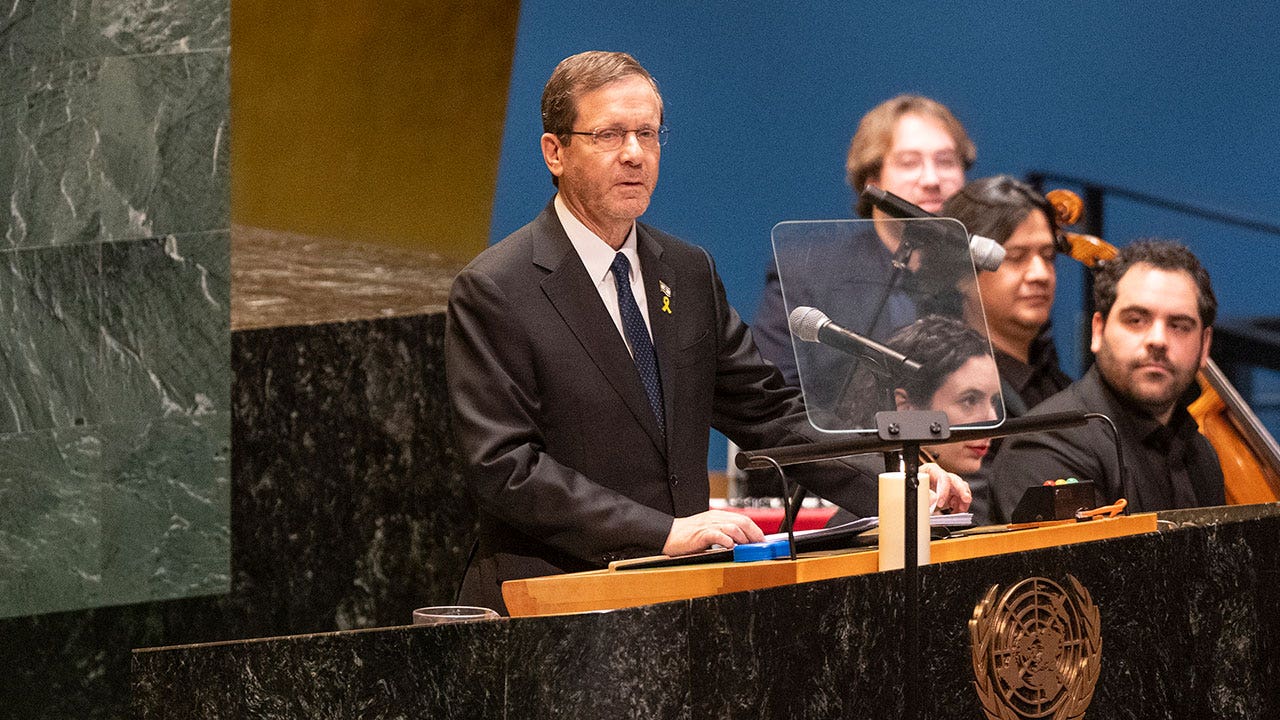
As the world marked International Holocaust Remembrance Day and the 80th anniversary of the liberation of the Auschwitz death camp on Monday, the world’s oldest hatred is again on the rise.
Israeli President Isaac Herzog addressed the United Nations in honor of the solemn anniversary on Monday, saying the “moral beacon” of the U.N. had “been eroded time and again.”
Speaking to a packed General Assembly Hall, he asked, “How is it possible that international institutions, established as an anti-Nazi alliance, allow murderous antisemitic views to flourish unhindered, in the shadow of the greatest massacre of Jews since World War II? How is it possible that those institutions that were established in the wake of the greatest genocide in history – the Holocaust – distort the definition of ‘genocide’ in favor of one and only goal: attacking the State of Israel and the Jewish people; while embracing the despicable phenomenon of ‘reversing the Holocaust.’”
GLOBAL RISE IN ANTISEMITISM LEAVES JEWISH COMMUNITY ISOLATED, RABBI SAYS WORLD AT ‘A TIPPING POINT’
Israeli President Isaac Herzog speaks during the Holocaust memorial ceremony at the United Nations in New York on Jan. 27, 2025. (Lev Radin/Sipa USA/Sipa via AP Images)
Herzog added that “antisemitism, barbarism, cruelty, and racism” thrive at the U.N. because “too many of the nations represented here – do not confront them, do not unanimously condemn them, and do not fight against them.”
A recent report released by the Anti-Defamation League (ADL) found in its latest Global 100 survey that 46% of the world’s 2.2 billion adults “harbor deeply entrenched antisemitic attitudes,” a number “more than double” what the ADL recorded through the survey in 2014.
The ADL survey reflects the percentage of adults queried who “answered ‘definitely true’ or ‘probably true’ to six or more of the 11 negative stereotypes about Jews that were tested.” Responses ranged from 5% in Sweden and 8% in Norway, Canada, and the Netherlands, to 97% in Kuwait, the West Bank and Gaza.
Seventy-six percent of respondents in the Middle East and Africa, 51% in Asia, and 49% in Eastern Europe were found to agree with most antisemitic tropes surveyed. Though the respondents living in the Americas (24%), Western Europe (17%) and Oceania (20%) expressed less agreement with antisemitic statements, countries in these regions have seen tremendous incidents of violent antisemitism since Oct. 7, 2023.
AUSCHWITZ 80 YEARS SINCE LIBERATION: RYSZARD HOROWITZ’S STORY OF SURVIVAL AND MAKING THE AMERICAN DREAM

Antisemitic hate on display at an anti-Israel protest in London. (Campaign Against Antisemitism on X)
In response to growing problems in the U.S., some in the American Jewish community have begun looking for safety outside the country. Israel’s Ministry of Immigration and Absorption, according to media reporting, said 3,340 Americans had immigrated to Israel as of September 2024. This represents a more than 30% increase from the 2,479 Americans who immigrated to Israel in 2023.
Nuri Katz, founder of Apex Capital Partners, has helped clients procure citizenship through investment for 32 years. Over the last five years, Katz told Fox News Digital that his Jewish client base expanded due to record levels of antisemitism inside the U.S. “American Jews are scared of being stuck and not being able to leave, just like many of their forefathers were stuck in Europe after the beginning of World War II,” he explained.
Katz said a popular choice among his Jewish clients is citizenship through investment in small Caribbean countries like St. Kitts and Antigua.
Though a long-awaited ceasefire and partial hostage exchange between Israel and Hamas is underway, the state of antisemitism around the world could be difficult to rein in.
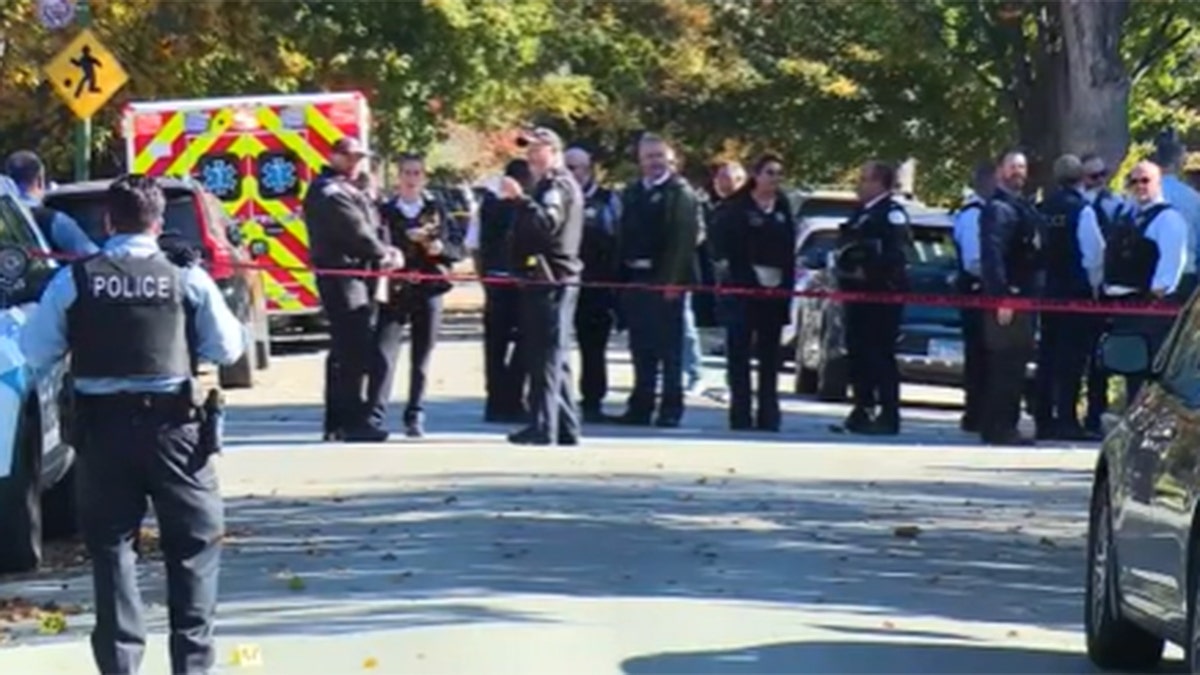
A Jewish man was shot in the shoulder in Chicago in an antisemitic hate crime. (Fox 32 Chicago)
Rabbi Moshe Hauer, executive vice president of Orthodox Union, told Fox News Digital, “It will certainly take time for the world to get the distortions of the past year and a half out of their mind.” He emphasized that “the Jewish people, the Israeli government, the soldiers of the Israel Defense Forces, have been waiting for the day when they can stop the fight, when they can start just building everybody’s future in a positive way, and being able to go back to working on providing the world with solutions to problems. And we’re very, very eager to get back to that.”
In the meantime, “elevated security costs are everywhere in the Jewish community,” Hauer said, explaining that some refer to the expense as “the antisemitism tax.” As a congregational rabbi in the 1990s, Hauer said, “Security in the synagogue meant the last person out should turn the button on the lock.” Today, he said, “Security committees are the most active committees in most synagogues.”
JEWISH HIGH SCHOOLERS FIGHT HATE WITH COMMUNITY SUPPORT, FACE NARROWING PROSPECTS FOR COLLEGIATE FUTURE
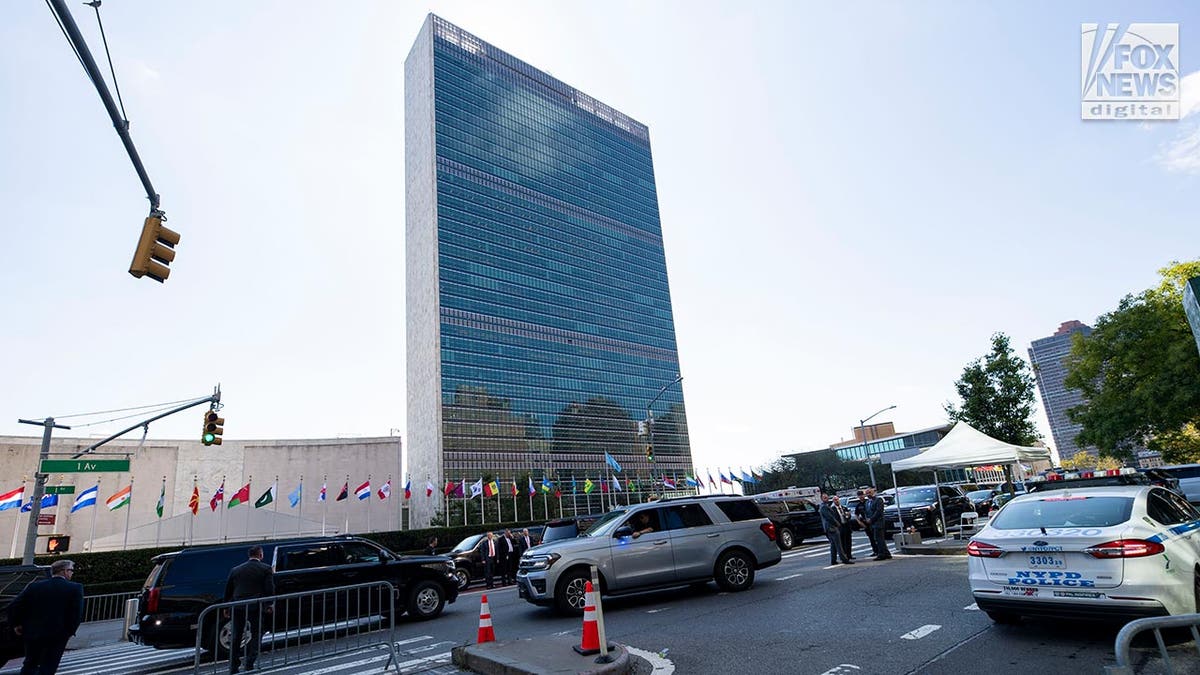
The United Nations building in New York City, Sept. 19, 2023. (Julia Bonavita for Fox News Digital)
The cost is “way more than the significant dollars” spent on security, Hauer said. “The cost is that the energy and the resources which faith communities should be investing in strengthening family and strengthening community… is being diverted” to turn “communal Jewish homes into fortresses.”
As a note of “good news,” Hauer said the hate emanating from “mass protests has, thank God, improved,” adding, “And that speaks to the better nature of the masses of both leaders and responsible people in this country, as well as the citizens.”
“We are hopeful,” he said, explaining that America has “a sometimes too-silent majority that despises the acts of hate which are being committed against anybody.” Hauer also added that the country “has to correct itself.”
With only some of the remaining hostages slated to be released at present, the time for relief has yet to arrive.
Hauer called on a dichotomous mixture of hope and dismay in a press release about long-awaited hostage transfers. “We rejoice with the hostages who are being released, and we weep with those remaining in the hands of Hamas,” Hauer said.
“We are grateful that the new administration worked with the old to bring the necessary pressure to bear on Hamas, but we are incensed that the world has allowed this to go on for so long. We are grateful to President Trump for moving quickly to bring freedom to many, but we will not forget for even a moment the many who remain. There should still be hell to pay,” Hauer said.
World
Georgia reacts angrily to EU suspension of visa-free travel
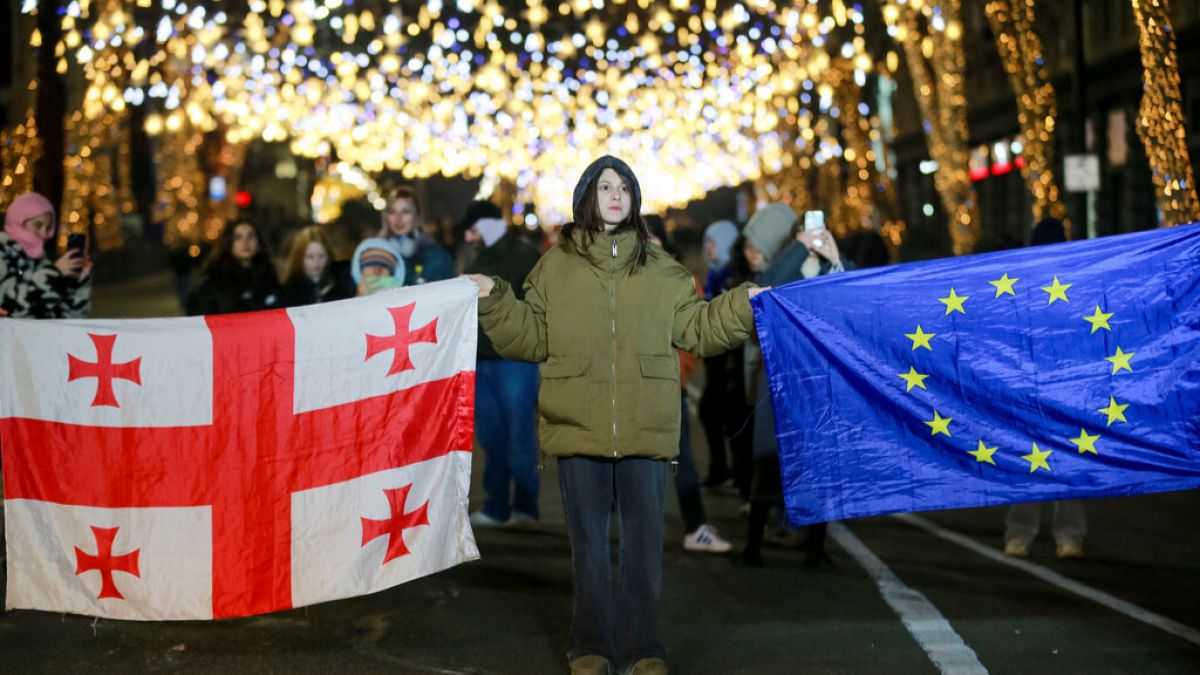
The European Commission had proposed to suspend the visa-free travel regime for Georgian diplomats and officials in response to the violent crackdown on protesters, who took to the streets for weeks to denounce the ruling party’s gradual pivot away from Europe and towards Russia.
Georgia has reacted angrily to the suspension of a mutual visa-free travel agreement by the European Union.
The development may lead to Georgian diplomats and officials having to apply for visas when travelling to an EU member state.
Speaking to Euronews a day after the announcement of the suspension, Georgian foreign minister Maka Botochorishvili called the decision “politically wrong.”
“Legally, it is absolutely groundless and nonsense. There is no proof or explanation how Georgian diplomats are creating threats or threatening public order in the European Union or EU member states,” she said.
“I just think that it is absolutely against European values or something that we refer to very often, and that is very unfortunate.”
‘Intention to be part of the EU’ still there
The decision by the European Council came in response to controversial laws that the Georgian parliament passed last year that undermine basic democratic rights, according to Brussels.
It was described as a reaction to the adoption of controversial Georgian laws on foreign influence and family values.
Polish Minister of the Interior and Administration Tomasz Siemoniak said “fundamental rights and democratic values are core principle of EU integration,” adding that officials from a country “which trample down these values should not benefit from easier access to the EU.”
Botchorishvili rejected this notion – stressing Georgia’s willingness to pursue its path to EU membership.
“Georgia has been a dedicated partner for the European Union and that is not just empty words,” she said, adding that her country “is there with this intention to be part of the European Union. And we are very serious about that.”
Following a decision of the Georgian government in November 2024, the opening of negotiations with the EU about membership is suspended until 2028.
World
Jon Stewart Slams Democrats for Panicking About Donald Trump’s Executive Orders, Calling Him ‘Un-American’ and ‘Authoritarian’ When They Should Be Providing Solutions

On this week’s episode of “The Daily Show,” Jon Stewart slammed Democrats for calling Donald Trump “un-American” and “authoritarian” for signing a flurry of executive orders during his first week in office when in reality he is operating within his constitutional rights as president.
Stewart opened the segment with a compilation of news outlets ringing the alarm on a Friday night “purge” executed by Trump.
“Ah! Trump has ushered in the purge,” Stewart yelled, pulling out a foam axe from under his desk. “Although, just in case I’m misinterpreting, what is this purge about, exactly?”
Another news compilation then played, clarifying that Trump had fired at least 17 “government agency watchdogs” known as “inspectors general” on Jan. 24.
“No! He got rid of 17 inspectors general? That only leaves… No one knows how many left,” Stewart joked. “Who knows how many generals will now go uninspected? Democrats, inspire my anger, in the least charismatic way possible!”
Stewart then ran a clip of Democratic Senator Chuck Schumer labeling Trump’s removal of the “inspectors general” a “glaring sign” that a “golden age for abuse in government and even corruption” is upon us. However, “The Daily Show” host was quick to point out that Trump has the legal right to remove any such government agent at any time. The only thing Trump failed to do was provide 30 days’ notice and a comprehensive list of reasons why.
“I’m sorry, what? Apparently, you can fire them but you have to give them 30 days’ notice. That is what we are upset about?” Stewart said. “But this is the cycle we find ourselves in. First law of Trump-o-dynamics: Every action is met with a very not-equal overreaction. Thus throwing off our ability to know when shit is actually getting real. Like last week’s pardons.”
Clips played of liberal pundits attacking Trump’s pardons as “unconstitutional,” “authoritarian” and “un-American.” Once again, Stewart noted that it is a president’s constitutional right to grant pardons.
“For some reason, we have given presidents the power of a king, and then we say, ‘Well, you’re not going to get all kingly and shit on us, right?’ To put that in constitutional terms, if I could, don’t hate the player, hate the founding fathers,” Stewart said. “Because I don’t know if you’ve met Donald Trump, he pushes shit.”
Stewart closed the segment with a call to action for Democratic leaders: “The question is probably not, ‘How dare he?’ The question should be, ‘What are you learning from this? How would you use this power? What is your contract with America?’ Democrats, exist outside of him. Tell people what you would do with the power that Trump is wielding, and then convince us to give that power to you as soon as possible! That is the goal!”
Watch the full segment below.
-

 Culture1 week ago
Culture1 week agoBook Review: ‘Somewhere Toward Freedom,’ by Bennett Parten
-

 Business1 week ago
Business1 week agoOpinion: Biden delivered a new 'Roaring '20s.' Watch Trump try to take the credit.
-

 News1 week ago
News1 week agoJudges Begin Freeing Jan. 6 Defendants After Trump’s Clemency Order
-

 Business5 days ago
Business5 days agoInstagram and Facebook Blocked and Hid Abortion Pill Providers’ Posts
-

 News3 days ago
News3 days agoHamas releases four female Israeli soldiers as 200 Palestinians set free
-

 Politics4 days ago
Politics4 days agoOklahoma Sen Mullin confident Hegseth will be confirmed, predicts who Democrats will try to sink next
-

 World3 days ago
World3 days agoIsrael Frees 200 Palestinian Prisoners in Second Cease-Fire Exchange
-

 News1 week ago
News1 week agoA Heavy Favorite Emerges in the Race to Lead the Democratic Party
